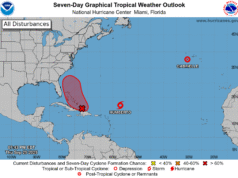
ORLANDO, Fla. (AP) — Students and teachers can discuss sexual orientation and gender identity in Florida classrooms, provided it’s not part of instruction, under a settlement reached Monday between Florida education officials and civil rights attorneys who had challenged a state law which critics dubbed “Don’t Say Gay.”
The settlement clarifies what is allowed in Florida classrooms following passage two years ago of the law prohibiting instruction on sexual orientation and gender identity in early grades. Opponents said the law had created confusion about whether teachers could identity themselves as LGBTQ+ or if they even could have rainbow stickers in classrooms.
Other states used the Florida law as a template to pass prohibitions on classroom instruction on gender identity or sexual orientation. Alabama, Arkansas, Indiana, Iowa, Kentucky and North Carolina are among the states with versions of the law.
Under the terms of the settlement, the Florida Board of Education will send instructions to every school district saying the Florida law doesn’t prohibit discussing LGBTQ+ people, nor prevent anti-bullying rules on the basis of sexual orientation and gender identity or disallow Gay-Straight Alliance groups. The settlement also spells out that the law is neutral — meaning what applies to LGBTQ+ people also applies to heterosexual people — and that it doesn’t apply to library books not being used for instruction in the classroom.
The law also doesn’t apply to books with incidental references to LGBTQ+ characters or same-sex couples, “as they are not instruction on sexual orientation or gender identity any more than a math problem asking students to add bushels of apples is instruction on apple farming,” according to the settlement.
“What this settlement does, is, it re-establishes the fundamental principal, that I hope all Americans agree with, which is every kid in this country is entitled to an education at a public school where they feel safe, their dignity is respected and where their families and parents are welcomed,” Roberta Kaplan, the lead attorney for the plaintiffs, said in an interview. “This shouldn’t be a controversial thing.”
“We fought hard to ensure this law couldn’t be maligned in court, as it was in the public arena by the media and large corporate actors,” said Ryan Newman, an attorney for the state of Florida. “We are victorious, and Florida’s classrooms will remain a safe place under the Parental Rights in Education Act.”
The law has been championed by the Republican governor since before its passage in 2022 by the GOP-controlled Florida Legislature. It barred instruction on sexual orientation and gender identity in kindergarten through the third grade, and it was expanded to all grades last year.
Republican lawmakers had argued that parents should broach these subjects with children and that the law protected children from being taught about inappropriate material.
The law also triggered the ongoing legal battles between DeSantis and Disney over control of the governing district for Walt Disney World in central Florida after DeSantis took control of the government in what the company described as retaliation for its opposition to the legislation. DeSantis touted the fight with Disney during his run for the 2024 GOP presidential nomination, which he ended earlier this year.
Kaplan said they believed the appellate court would have reversed the lower court’s decision, but continuing the lawsuit would have delayed any resolution for several more years.
“The last thing we wanted for the kids in Florida was more delay,” Kaplan said.
Disclaimer
The information contained in South Florida Reporter is for general information purposes only.
The South Florida Reporter assumes no responsibility for errors or omissions in the contents of the Service.
In no event shall the South Florida Reporter be liable for any special, direct, indirect, consequential, or incidental damages or any damages whatsoever, whether in an action of contract, negligence or other tort, arising out of or in connection with the use of the Service or the contents of the Service. The Company reserves the right to make additions, deletions, or modifications to the contents of the Service at any time without prior notice.
The Company does not warrant that the Service is free of viruses or other harmful components
This article originally appeared here and was republished with permission.












